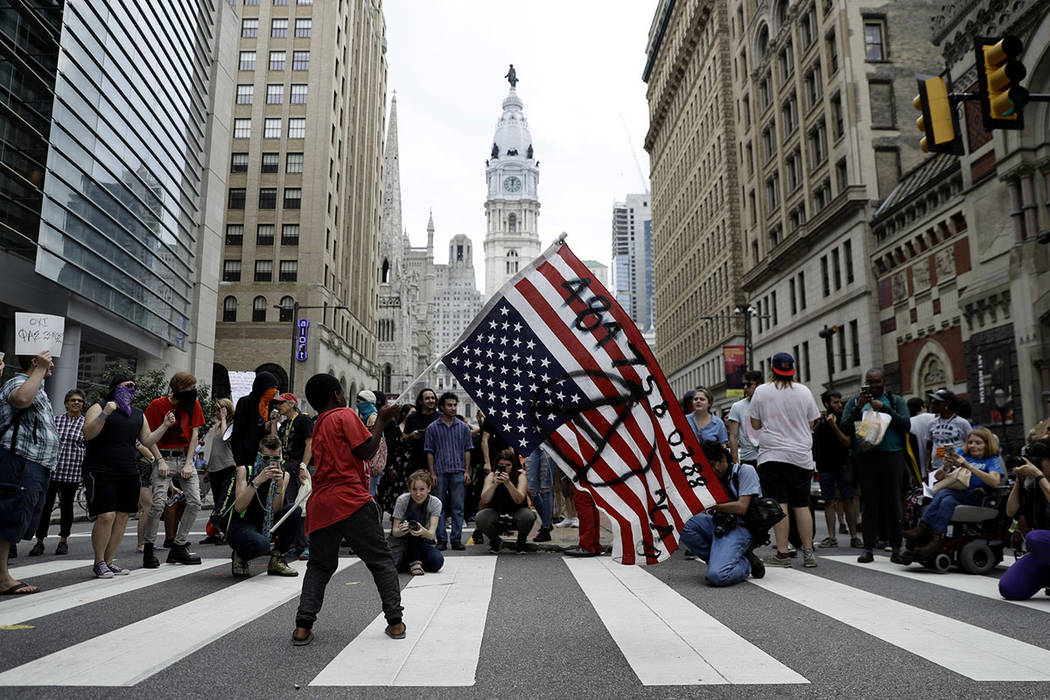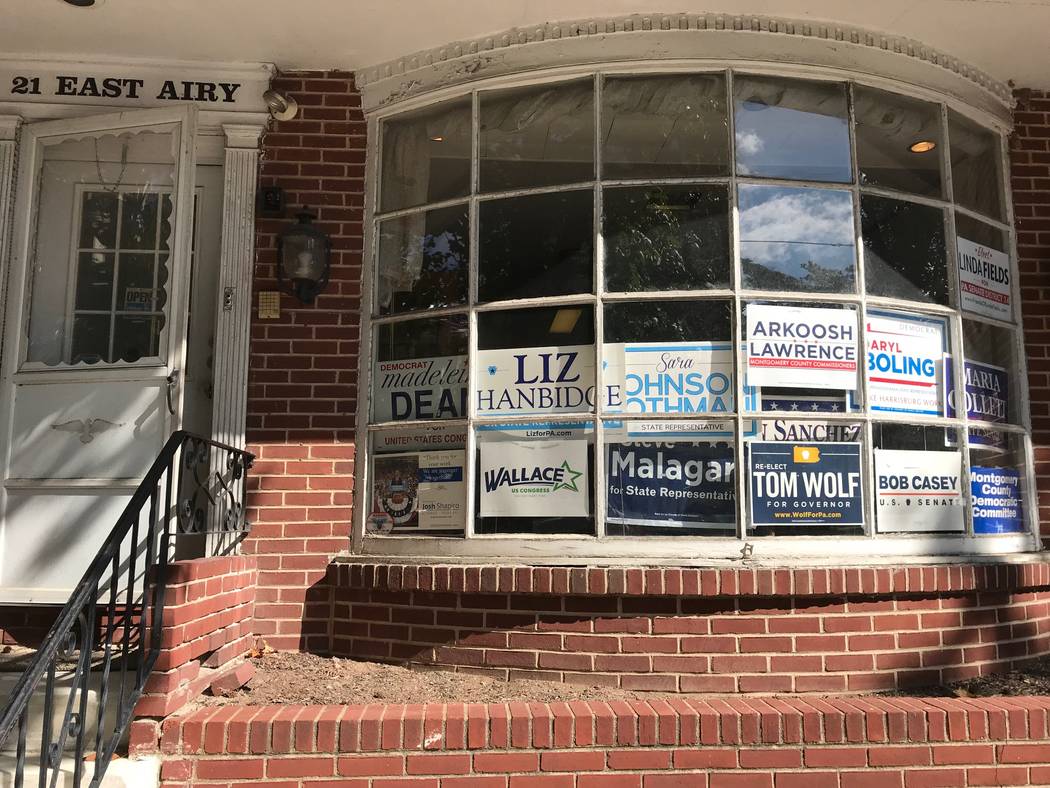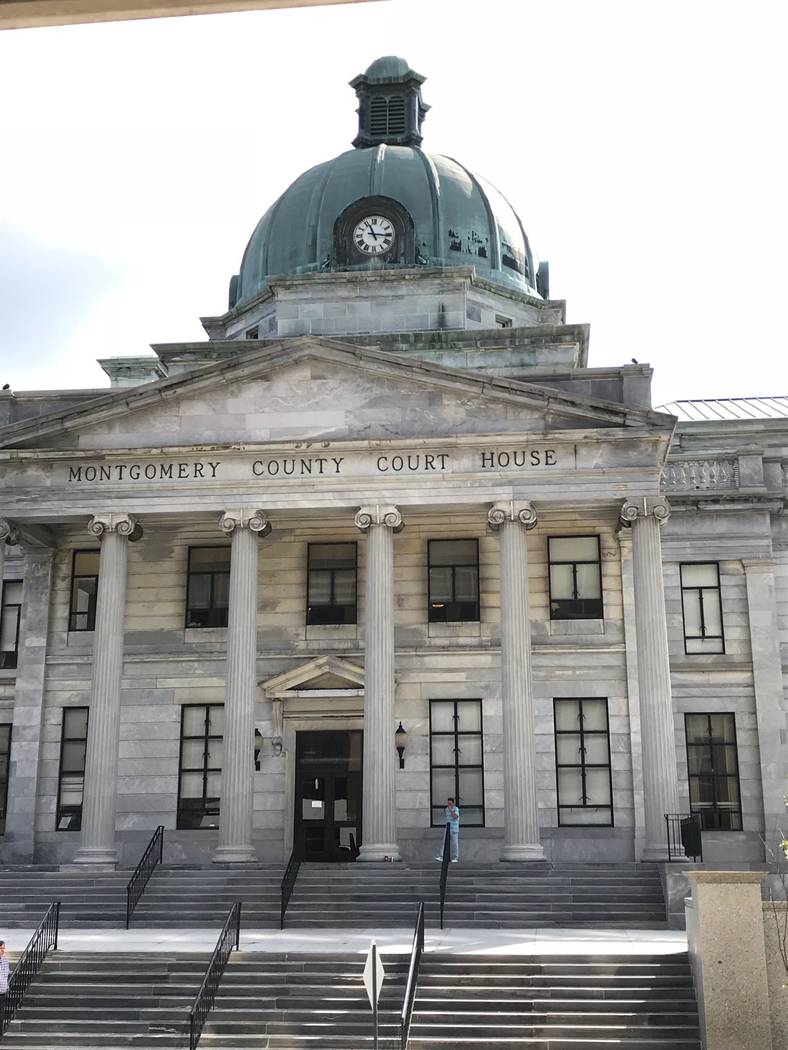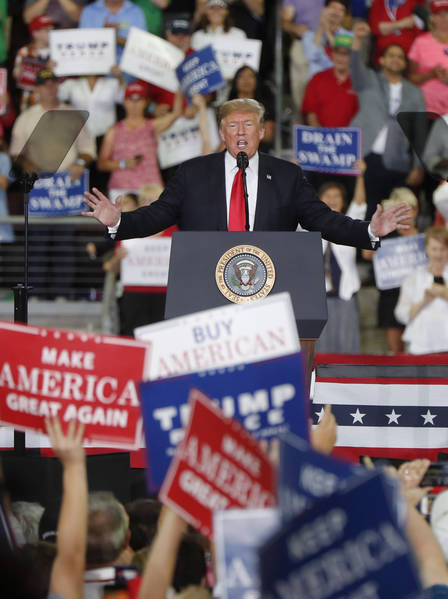Pennsylvania key to House control after Kavanaugh fight







NORRISTOWN, Pa. — Temple University student Daisy Confoy represents the “blue wave.”
Opposed to President Donald Trump’s policies, she is registering new voters in the Philadelphia subway and on sidewalks, working to turn out Democratic voters in the midterm elections.
“We’re here fighting against a culture of intolerance,” said Confoy, 19, a first-time voter. She lists her concerns with Trump administration policies: immigration, civil rights, health care and the confirmation battle over Supreme Court nominee Brett Kavanaugh.
“The Kavanaugh hearings were a wake-up call for a lot of young women,” she said.
Confoy was protesting outside the Pennsylvania Convention Center when Trump received applause from about 3,000 men and women inside at a National Electrical Contractors Association convention.
The crowd roared when Trump spoke about economic gains spurring hiring by American companies and policies geared toward increased domestic manufacturing.
At campaign events around the country, Trump also touts the Kavanaugh confirmation as a GOP success — and a loss by lawmakers who may seek to impeach the controversial judge if Democrats win control of the House.
With less than 30 days before Nov. 6, the midterm election is largely seen as a referendum on Trump’s performance, which political strategists on both sides claim has energized their voter base.
While the Kavanaugh fight is expected to help the GOP hold its majority in the Senate, putting red state Democrats in peril, Republicans could lose control of the House of Representatives as Democrats target suburban Republican and independent women voters.
Pennsylvania races key
Pennsylvania is a Rust Belt state that Trump won in 2016, but the state is key to the Democratic Party’s strategy to win 23 seats nationally and take back control of the House.
Unlike Nevada, where Democrats are playing defense trying to hold two suburban Las Vegas congressional districts, Pennsylvania gives the party a chance to flip six House seats — nearly a quarter of those needed to win control.
The Pennsylvania Supreme Court in January ruled that a seven-year old GOP redistricting map was unconstitutional, and the court drew new congressional lines aimed at making districts more competitive.
“I am appalled that a partisan (state) Supreme Court could rewrite a map the way they did,” said Rep. Steve Stivers, R-Ohio, chairman of the National Republican Congressional Committee. “I think those judges should be impeached.”
In addition, pollsters have found Democrats are more motivated to vote in the upcoming election.
A recent poll by Franklin & Marshall College in Lancaster, Pennsylvania, showed that 64 percent of registered Democrats were enthusiastic about voting Nov. 6, compared with 58 percent of registered Republicans.
The Pennsylvania poll echoes a national survey by the Pew Research Center that found voter enthusiasm is at its highest level during any midterm in more than two decades. A record share of registered voters, 72 percent, said the issue of which party controls Congress will be a factor in their vote.
Trump also continues to be a consideration for voters. The Pew survey found 60 percent of those who responded said their vote would be an expression about the president’s performance — with 37 percent against and 23 percent for Trump.
“There is something incredible happening across America,” said Rep. Ben Ray Lujan, D-N.M., the chairman of the Democratic Congressional Campaign Committee.
“We are running strong in places where Democrats have not been competitive for some time: North Carolina, Florida, Pennsylvania, Illinois,” Lujan said.
Nevada’s competitive races
In Nevada, the NRCC and DCCC are optimistic about competitive races in the 3rd and 4th congressional districts.
Democrat Susie Lee and Republican Danny Tarkanian are battling for the District 3 seat being vacated by Rep. Jacky Rosen, a Democrat, who is running for Senate.
In the open Nevada District 4 race, Democrat Steven Horsford and Republican Cresent Hardy are fighting to win the seat each has already held, years earlier. Rep. Ruben Kihuen, D-Nev., announced he would not seek re-election following allegations of sexual misconduct, which he has denied.
The nonpartisan Cook Political Report, which analyzes congressional contests, has rated the District 4 race as “likely Democrat” and the District 3 contest as “leans Democrat.”
Both Stivers and Lujan talk up their recruits in the two Nevada races and express confidence in their campaigns.
“Nevada on the whole is a very competitive state,” Lujan said. “And we have important races on the top of the ballot.”
Nevada’s congressional races have been overshadowed by the nationally watched Senate battle between Republican incumbent Dean Heller and Democratic challenger Rosen.
With Heller considered the most vulnerable Republican senator up for re-election, national media focus has been on the race that could reshape the makeup of the upper chamber, where the GOP has a razor-thin 51-49 majority.
Heller voted with Republicans to confirm Kavanaugh. The senator praised the nominee’s judicial record and said the FBI failed to find any evidence or witnesses to corroborate allegations of sexual misconduct from nearly three decades ago.
Rosen has attacked Heller for failing to take the allegations seriously, and calling them “a hiccup” in the confirmation process. Rosen characterized Heller as a “rubber stamp” to the reckless Trump agenda.
Heller has responded with attacks of his own. He said Rosen was a puppet of House Minority Leader Nancy Pelosi and Senate Minority Leader Charles Schumer.
Effect on turnout
Charlie Cook, writing in the Cook Political Report, said the Kavanaugh confirmation battle is unlikely to sway party voters or play a big role in the decisions of independents, but it may affect turnout.
Even before the Kavanaugh battle, Cook noted, “one can make a case that this blue Democratic wave is actually a pink wave, as we are seeing surging numbers of women voters, donors and candidates this year.”
Fundraising for the 2018 midterm is higher than during the last election cycle, with candidates raising $1.7 billion, the parties raising $1.3 billion and outside spending from political action committees and interest groups totaling $550 million, according to the Center for Responsive Politics, a nonpartisan watchdog group.
In Montgomery County, Pennsylvania, home to Philadelphia suburbs and parts of three congressional districts, voter registration appears to be up, but the totals won’t be known until after mail-in registrations are tabulated. The last day to mail in a form was Tuesday, according to Karley Sisler, director of voter services.
Madeleine Dean, a Democratic state representative, opposed Kavanaugh and voiced concern about abortion rights in her campaign against Republican Dan David, a businessman, in the newly drawn 4th Congressional District. It includes Norristown in Montgomery County, where Hillary Clinton won 59 percent of the vote in 2016.
Nearby, in the new 7th Congressional District, an open seat, attorney Susan Wild, a Democrat, faces Republican Marty Nothstein, an Olympic cyclist, and Tim Silfies, a television reporter running as a Libertarian.
Wild is running as a mom with a platform to protect Medicare and Social Security, health care benefits and civil rights for minorities and the LGBT community. She is endorsed by former President Barack Obama.
Nothstein is touting economic gains made with a Republican president and Congress — “results versus resistance.”
Dean and Wild have teamed with two other women congressional candidates for Pennsylvania seats, Chrissy Houlahan and Mary Gay Scanlon, who call themselves the “Fab 4.”
In Pennsylvania, notably Philadelphia, its suburbs and its exurbs, the Kavanaugh confirmation could be a factor at the ballot box.
“If something as serious as Kavanaugh’s confirmation doesn’t push women to the polls, I don’t know what will,” Confoy said. “It’s crucial that we rise to the occasion.”
Contact Gary Martin at gmartin@reviewjournal.com or 202-662-7390. Follow @garymartindc on Twitter.
Battle for Congress
All 435 seats in the House of Representatives are up for election. Of those, there are 51 open Republican seats and 23 open Democratic seats this election cycle, according to the House. That includes two Nevada seats.
Overall, 68 House races are rated competitive by the Cook Political Report’s David Wasserman. His analysis shows women Democrats are candidates in 53 percent of the match-ups and Republican women are candidates in 24 percent of those races.
In the Senate, 24 Democratic seats, nine Republican seats and two held by Independents are up for election.














